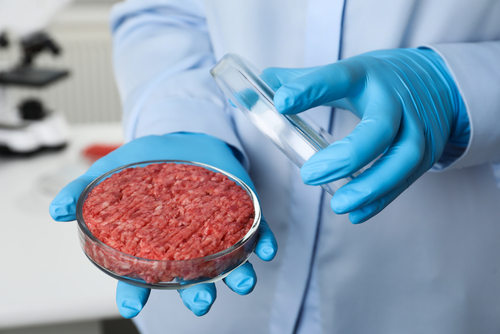FSA full steam ahead: the push for approval on new alternative proteins
- Like
- Digg
- Del
- Tumblr
- VKontakte
- Buffer
- Love This
- Odnoklassniki
- Meneame
- Blogger
- Amazon
- Yahoo Mail
- Gmail
- AOL
- Newsvine
- HackerNews
- Evernote
- MySpace
- Mail.ru
- Viadeo
- Line
- Comments
- Yummly
- SMS
- Viber
- Telegram
- Subscribe
- Skype
- Facebook Messenger
- Kakao
- LiveJournal
- Yammer
- Edgar
- Fintel
- Mix
- Instapaper
- Copy Link
Posted: 2 April 2025 | Gioia Zagni | No comments yet
Lab-grown meat, the next frontier in alternative proteins, is making its way to the UK market. Gioia Zagni explores its potential to transform food production, reduce environmental impact, and gain consumer acceptance.


Lab-grown meat, a promising innovation in alternative proteins, is set to revolutionise the UK food market by offering sustainable and ethical food alternatives. Credit: Shutterstock
Lab-grown meat has officially hit the UK market…in dog food. In this article, Gioia Zagni, Chief Scientific Officer and climate expert at Klimato, reflects on the conversations this development has sparked surrounding its natural progression for human consumption.
The UK’s departure from the EU means it is no longer bound to the EU’s complex food regulatory system, yet consumers are increasingly demanding more sustainable and responsibly sourced products. In response, the Food Standards Agency (FSA) is now seizing the opportunity to speed up the approval process for food production. This streamlined approach could bring cultivated meat to UK consumers in as little as two years.
But naturally, these changes raise some important questions about its potential for widespread success. So what does lab-grown meat mean for the food industry?
The current market situation
Lab-grown meat, also termed cultivated or cultured meat, is produced by growing animal cells in bioreactors under controlled conditions, eliminating the need for traditional livestock farming. However, to succeed in the market, the product must gain consumers’ trust.
Lab-grown meat has the potential to revolutionise food production, offering a way to reduce reliance on traditional farming practices that contribute to climate change.
You will have heard of cultured meat before as it is already approved for human consumption in some regions. Singapore was the first to approve these protein alternatives, giving cell-cultivated chicken the green light back in December 2020. A few years later, Israel and the US followed suit, releasing lab-cultured beef in 2023 and 2024 respectively.
Recent studies, however, reveal that consumers show resistance to lab-grown meat, probably because it is unfamiliar territory, which can make it harder to accept. Customers are also likely to question factors such as taste, nutritional value and affordability.
In order that food businesses and consumers can embrace these alternatives on a large scale, food producers must build this trust. This will require educating consumers on the way it is produced to increase transparency, aid understanding and engender confidence. Semantics also have a role to play. For example, the same researchers suggest that calling it ‘clean meat’ rather than ‘lab-grown meat’ could increase the chances of winning consumers. Finally, they must adhere to rigorous regulatory oversight to demonstrate that the meat is safe, nutritious and responsibly sourced.
How will ‘clean meat’ impact food producers?
The implications of clean meat extend far beyond a new food product, presenting both opportunities and challenges for the UK economy. Here are a few ways lab-grown meat might shake up the food production sector.
Traditional farming practices account for 70 percent of food-related emissions and contribute to land use, water consumption, pollution and biodiversity loss. The ‘clean meat’ alternative would reduce reliance on these damaging practices. However, the process of creating lab-grown meat is energy intensive, which raises concerns – particularly if it is powered by fossil-based energy – as the environmental benefits could be diminished. Yet the topic remains up for debate, as others argue that cultured meat could potentially generate 78-96 percent lower greenhouse gas emissions compared to conventional meat production.
Lab-grown meat has the potential to revolutionise food production, offering a way to reduce reliance on traditional farming practices that contribute to climate change.
As the production process is still in its early stages, it is likely that as technology progresses and these revolutionary methods become more widely adopted, curated meat practices will become more efficient over time.
Nutrition and food safety
Due to the highly controlled environment necessary to develop lab-grown meat, there is reduced risk of contamination, which supports food safety. This controlled environment also facilitates nutritional customisations to meet specific dietary needs, such as enriching product with vitamins or modifying fat content.
The next step for sustainable proteins
The emergence of cultivated proteins in the UK market, despite its initial foray being into pet food, marks a milestone in food production. With clean meat well on its way to obtaining permission for human consumption in the UK, the next phase comes down to navigating consumer acceptance and delivering a demonstrably lower carbon footprint.
Labs will need to develop efficient production methods that rely on renewable energy and demonstrate a tangible reduction in greenhouse gas emissions. This will ensure that the innovation will contribute to a low-carbon future.
The next few years will be critical in determining whether cultivated proteins can become a viable, scalable alternative for food producers. Only time will tell, and I will be here following its development.
About the author


Gioia Zagni is the Chief Scientific Officer at Klimato, leading a team of experts in carbon footprinting and Life Cycle Assessment (LCA). She oversees the science behind Klimato’s software, ensuring compliance with climate policies and helping businesses reduce their environmental impact. Drawing on her background in environmental strategy and carbon accounting, Gioia works to make climate impact assessment clear, practical, and actionable. Based in Stockholm, she works to drive sustainability through data-driven solutions.









